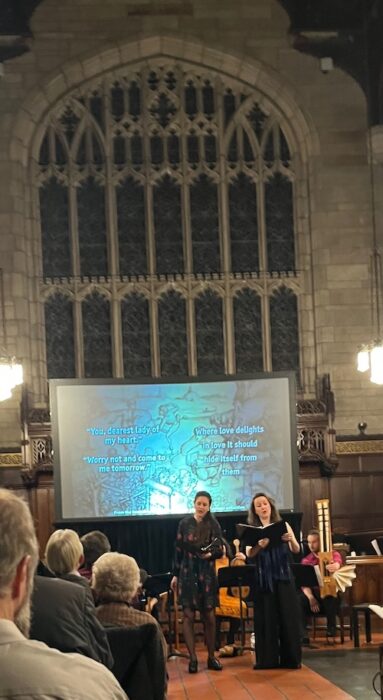Newberry Consort and friends take audience on engaging minstrel journey

The Newberry Consort has long been the venerable stalwart of Chicago’s early-music scene. Yet since taking the reins as artistic director in 2022, Liza Malamut has given the Consort a fresh infusion of energy, creativity and panache—witness their epic Praetorius program that made the Top Ten Performances last year.
Malamut and colleagues were joined by the Cleveland-based medieval trio Trobár, Friday night at the University of Chicago’s Bond Chapel for a more intimate program. “I Sing a New Song” paints the journey of a traveling minstrel in the Middle Ages. Blending lightly-worn scholarship with lively musical performances, the concert was a testament to the elusive art of curation, with rare music selected, varied and sequenced with consummate skill.
As laid out in the program note and projected narrative, once a year during Lent many secular musicians in the 12th-15th centuries would journey long distances to menestrel (minstrel) schools for what were essentially Middle Age music conventions. There they would meet musical colleagues, learn new songs, purchase instruments and compete for prizes.
Friday night’s program posited a minstrel journey from Paris to a menestrel school in Brussels in seven short sections. We travel with a group of Parisian minstrels to Brussels and back, meeting Spanish and Italian colleagues at stops in Cambrai, Mons and Valenciennes before returning to Paris.
This conjectural secular pilgrimage served as effective scaffolding for the evening’s music. While a few familiar names pop up amid the alternating instrumental and vocal pieces (Machaut, Dufay, Dunstable), most of the composers will likely be discoveries to all but nonspecialists, including Conrad Paumann, Gilles Binchois and the “Monk of Salzburg.”
The Trobár trio consists of singers Elena Mullins Bailey and Karin Weston with Allison Monroe playing vielle and rebec as well as lending occasional vocals. Bailey’s light, flexible soprano is especially apt for this repertoire, as displayed in her singing of Machaut’s “Puis que ma dolour” and the melancholy plaint of Binchois’ “Triste plaisir et douleureuse yoie.”
Weston’s darker but expressive timbre proved well suited to the Marian setting “Mariam matrem” and the melancholy farewell to Brussels of “Adieu, adieu, mon joieulx souvenir.” The two singers blended gracefully in the prayer-like “Christ qui lux es” and brought out the wry humor of Oswald von Wolkenstein’s duet “Wach auff, mein hort.”
The Trobár members made a cohesive ensemble with the four Newberry musicians throughout; the latter including Malamut playing medieval slide trumpet and Priscilla Herreid and Debra Nagy on period winds.
The most fascinating instrumentation was provided by Gabriel Smallwood on the organetto. A kind of Renaissance continuo, the organetto is a striking contraption that resembles an antic mix of vertical accordion and miniature confessional. In Smallwood’s hands, this pumped, portative pipe organ produced a mellow, warmly rounded sound that nicely supported the singers. Smallwood nicely showcased the organetto’s own expressive solo capabilities in a Paumann Prelude.
“Bevons, ma commerce” made a lively finale, as the minstrels celebrated their return to Paris and all the evening’s musicians joined in this buoyant drinking song.
In addition to its clear, glowing acoustic, Bond Chapel provided a suitable monastic setting for this program. If some of the narrative text projections were redundant—and at times overly jokey and vernacular—Shawn Keener’s projections of contemporary paintings and woodcuts provided a fine visual counterpoint to the live performers.
The program will be repeated 7:30 p.m. Saturday at Ganz Hall and 4 p.m. Sunday at St. Luke’s Episcopal Church in Evanston. newberryconsort.org
Posted in Uncategorized
Posted Mar 02, 2024 at 2:59 pm by Chilynne
What a spirited and thoroughly delightful program! I’d put this on a Do Not Miss list.